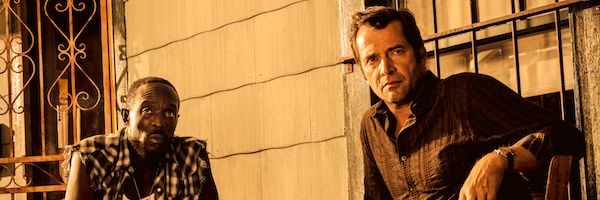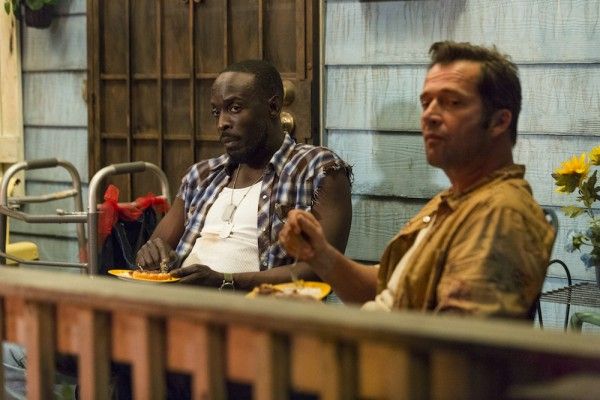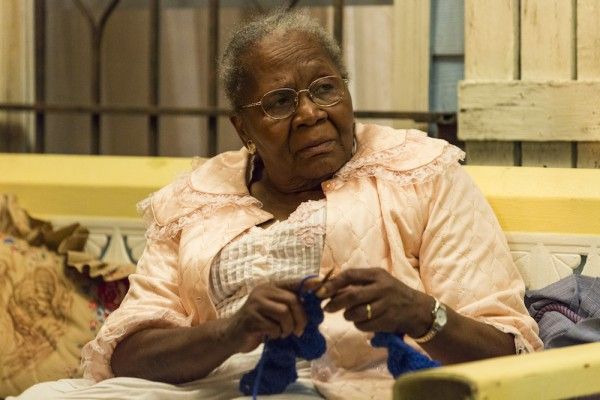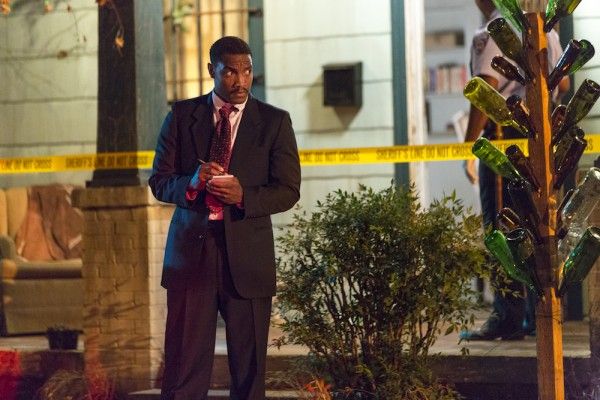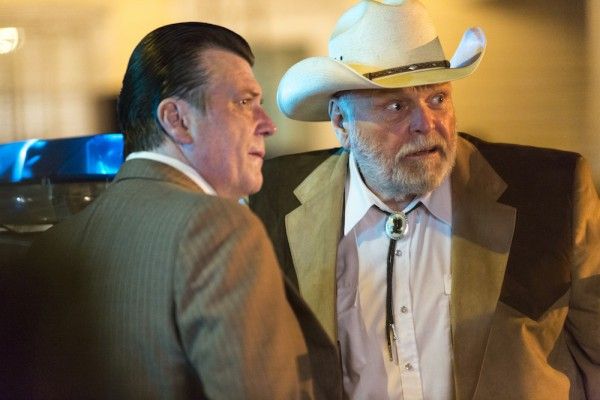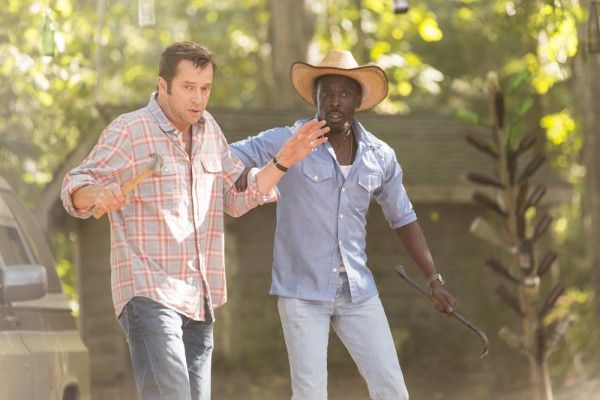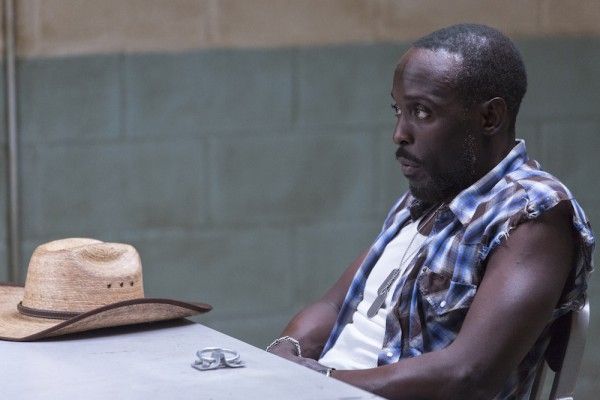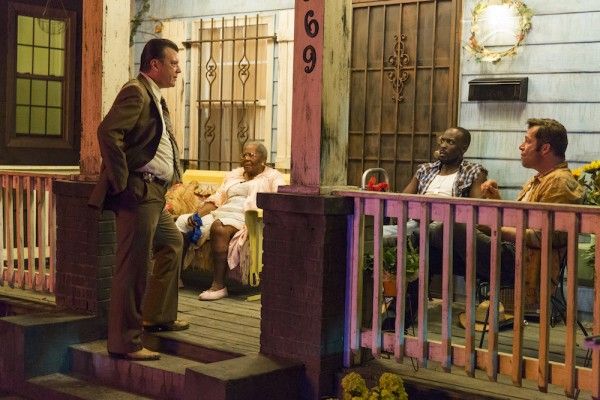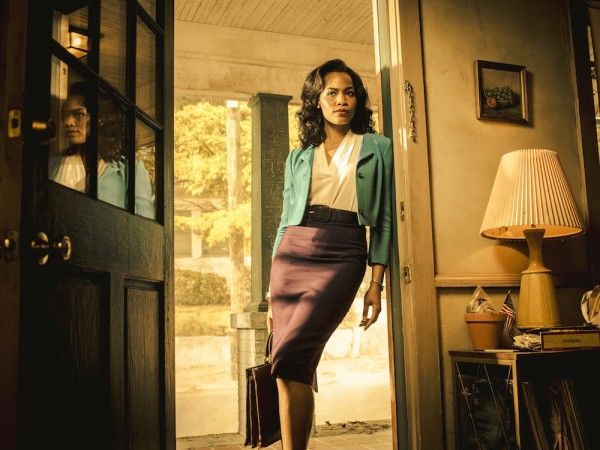Spoiler warning: If you aren’t caught up through the penultimate episode, “Pie a la Mojo,” do so before reading too far ahead.
There is a lot on TV, I get it — I watch as much as I can, and even the best shows can get repetitive. But one of the best selling points I have for SundanceTV’s Hap and Leonard is that there is not another show like it. The series follows two very different best friends, played by James Purefoy and Michael K. Williams, in East Texas in the 1980s, as they get caught up in heists and cons and even murder. But Season 2 hones in on some very complex stories about race in an emotionally authentic, but still surprisingly humorous way. Before the season finale, I was able to talk to the series’ showrunner John Wirth about Mucho Mojo’s politics, the show’s balance of light and dark themes, and the wonderful Irma P. Hall, who plays MeMaw. Wirth calls the series his “subversive little show. Not everybody gets it.” But if you do, and if you’ve been with it through Season 2, you’ll know it’s had an extraordinary run this year in telling a very difficult story. (You’ll also know that like the diner waitress, you’ll want to come back in another life as Tiffany Mack's Florida Grange).
This year's story has also stretched through time, as Hap and Leonard’s investigation of missing black children that the sheriff’s department has been apathetic about brings up a crime committed by the Klan long ago, as well as a string of murders that are connected to current events. I asked Wirth if there was a sense this year in adapting Mucho Mojo — which is the second book in Joe R. Lansdale’s Hap and Leonard series — of how important this particular story was. “I think for us we were trying to tell a story, and we were trying not to comment on the story we were telling. As James Purefoy says, ‘we were trying to tell the truth, and not tell anybody what the truth was that we were telling them.’”
That truth comes through in the show’s authenticity, which I said I’m particularly sensitive to as a southerner. “Yeah, and I’m very sensitive to it myself — I’m not a southerner, [but] I did four seasons of Hell on Wheels, and Anson Mount, the star of the show, is from Tennessee,” Wirth said. “That character was also a southern character, so we really sort of assiduously paid attention to southern mores and the differences between southern people and northern people. Anson always had a thing when we cast the show, and actors would do their ‘TV southern accent’ … it would drive him nuts. We do pay attention to that.”
In addition to that authenticity, part of what makes the storytelling so powerful this season is the gravity of the events Leonard and Hap are investigating. After spending so much time focusing on the details of the season’s arc with the serial killings, Wirth said that “I was very surprised to people’s reaction to the dark nature of the story, and sort of had to step back myself and see how dark it was, and what we were actually talking about in terms of race relations in America. Our story is a fictional story and not based on anything in the world, but there were the Atlanta child murders and what’s going on DC now, which is very current and kinda makes our story very relevant and very political.”
And yet, the show also has a quirky sense of humor that never becomes glib, even in the face of such serious crimes. Wirth says he learned how to balance those two very disparate things from, unexpectedly, Don Johnson:
“I remember one time I was working on this show called Nash Bridges, with Don Johnson and Cheech [Marin], and those guys were very colorful dressers, and their wardrobe was very colorful. And one time someone on the staff had written a line where they had arrived on a murder scene and they look down at the dead guy, and we had Nash Bridges make some comment about the guys’ clothes. Don Johnson called and he was livid. He was pissed, he went crazy. Because he said, ‘there’s a dead person lying on the floor, and you are giving me a line of dialogue where I’m making fun of that persons’ wardrobe?’ And as I’ve said many times over, all of the good lessons I’ve learned about writing for television I’ve learned from Don Johnson the hardest way, but the point was well taken you know. So I’ve tried to keep, in my own writing and within the writers room, let’s keep it light but let’s not make fun of the subject matter that we’re writing about, let’s treat that with all seriousness, let’s tell the truth and let’s not comment on this in any way shape or form, and let people draw from it what they want to draw from it.”
I mentioned how the short episode count might help with that, like how we don’t get to see Hap and Leonard mourn MeMaw, but how it might have been too depressing if we had. In that sense, does he help to have a short episode count that forces a story down to its essentials? Wirth says no, with some caveats regarding that particular scene (which wrecked me):
“I think this show could work with a larger episode order. I think when you’re writing a story it pays to take the advice of the master, Elmore Leonard, somebody asked him sometime what makes your stories so readable, and he said ‘I just leave out the parts everybody skips over anyway.’ So I think we try and do that. With MeMaw dying and that scene, the drama was in her talking about … I love that line ‘when your black boys don’t come home it means they’re dead.’ She’s so good, and when I was watching that live, she and I had had a lot of conversations about it, and we had really kinda worked over that scene and what was happening there […] and when I was watching her do it, I though ‘oh God, this isn’t going to work. She’s not doing anything!’ And then when I saw it on film. I just … I was wrecked, too. It was very, very moving, and I thought her performance was sublime to the nth degree, it was so good and so simple, and the light just went out of her, it was just amazing. So for me that was the drama and the meat of it. Seeing those guys deal with the body or call the coroners or go outside and tell Hanson that she died at her kitchen able or going to her funeral, all of those scenes we see and know in their minds that those scenes will lay out after that scene at the table, so it didn’t feel at all essential. Even if we had 20 episodes I don’t think we would have dramatized that.”
However, Wirth also talked about how there was a consideration of making MeMaw part of the murder plot with the Reverend, and being complicit in his acts. “We were seriously considering that deep into the writing process all summer. Then we got to Atlanta and this idea was still on the table, and it all kinda went back to what happened to her with the KKK when she was a child, and that the children who died that fire were sort of lost souls, and they needed angel escorts to find their way to heaven, and that she would be kind of involved the concept of ‘let’s create these angels.’”
But after Wirth saw Hall in action and her work on the series (Wirth also told me that after they first spoke to Hall over FaceTime that he and show creator Nick Damici knew “that’s MeMaw”), he wanted to go in another way. “MeMaw was not that character in the book, so Joe Lansdale had some very serious concerns about taking the story in that direction, and ultimately we didn’t and I think that was the right decision. But in the creative process, you’re always looking at all of your options, especially when you’re dealing with underlying material. I feel some responsibility to be true to the underlying material but also to create some surprises for viewers who are familiar with that material so they don’t know every beat that’s going to happen ahead of time.”
Another decision they weren’t sure would work before filming was the idea of having Ivan be albino. Wirth didn’t know that they could find an albino actor of the right age to play him, and they almost didn’t (they stumbled onto Olaniyan Thurmond nearly by accident, and he has been fantastic). I commented on how interesting that despite how unusual it is, Ivan being albino is just a fact on the show, and not something any character ever calls attention to or mentions. Wirth said that’s intentional: “I don’t like to comment on anything in a show even when I’m going through scripts, and if there’s a line of narrative and it’s commenting on something going on the scene I cross it out, because I don’t want to do that — things just are what they are!”
Speaking of, there may not be a scene that was more Texan than when Leonard rescued Hap on a horse from the fairground. Wirth described how that scene came about:
“Whenever you have an animal like that moving at-speed through a group of people it’s challenging. You have camera equipment there, we had cables all over the ground, all of those people right next to the horse have to be stunt people so they have to get out of the way. We had to have a Leonard stunt and a Hap stunt guy actually riding the horse, then we had to get Michael [Williams] up on the horse, then James [Purefoy] kinda mount the horse. It was 2 in the morning when we were shooting it, we had a very skittish horse, I think we had to change the horse out at some point. Actually we initially were going to use a black horse, the one that appears earlier when they’re on Shit Squad […] so the idea was Leonard went to get that horse and they take off on that horse, but that horse wouldn’t run on pavement. So they brought out another horse that would run on pavement, and it happened to be a white horse. No explanation in the story where that horse came from, but people loved that moment — that it was a white horse, that Leonard comes running up on a white steed and grabs Hap and they take off, it’s amazing [and] I love the cops’ reaction there watching them ride out. A very Hap and Leonard moment.”
The moment, perhaps more than any other, really encapsulated Hap and Leonard’s unique friendship. I asked Wirth if he thought the friendship between these two men, who are so different but can make it work, act accidentally as a kind of parable for our current political climate:
“I hope so. Joe Lansdale wrote these books 25 years ago, and I think the Hap and Leonard characters are relevant. I think Joe and I are roughly the same age, and I came of age in the late 60s and early 70s, and we thought we had put a lot of this stuff to rest. I’ve been as surprised as anybody, maybe even more surprised, to have seen the kind of nastiness and racist overtones of this current election. I just didn’t realize those feelings were still alive and well in this country, it was really a shock to my system. The beauty of Joe’s content is that you have a black, gay cowboy who might be a Republican, and you have a white, sort of laconic draft-dodger guy, and they’re best friends. And they never question anything about each others’ lives or predilections, they just are friends and they are very accepting of each other. So to the degree that we can present an example of how people can interact in the world, good. I’m all for that.”
The Hap and Leonard Season 2 finale airs Wednesday, April 19th on SundanceTV

